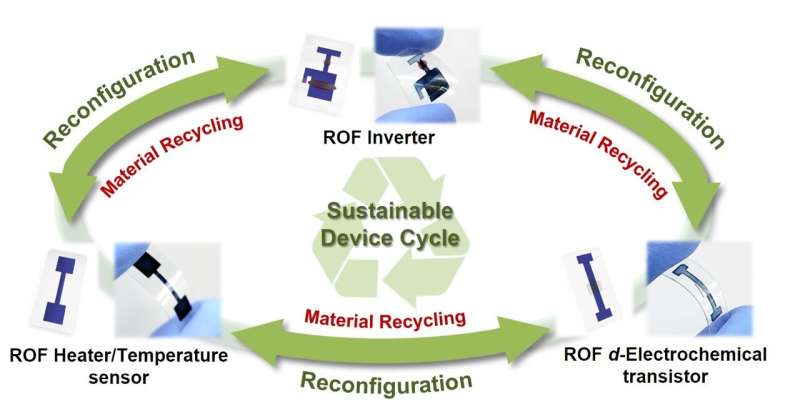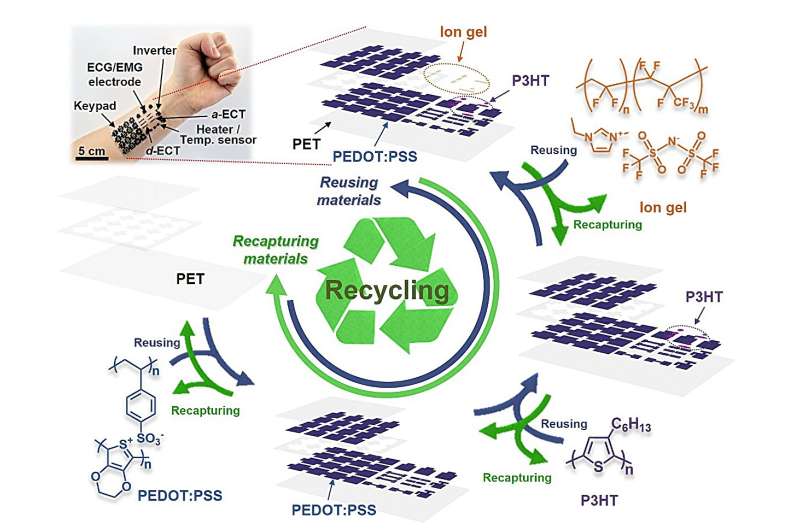A new method to develop recyclable, organic and flexible electronics
The electronics industry has been in continuous development over the past decades, leading to the development, fabrication and sale of a broad range of consumer devices. In recent years, many engineers have been focusing their efforts on flexible electronics that can be used to create wearable devices, such as smartwatches, earbuds, fitness trackers, and even smart jewelry, and electronic implants for medical applications.
While significant progress has been made towards the development of flexible electronics, the widespread commercialization of a growing number of electronics has raised significant concerns related to their sustainability. Some research teams have thus been trying to identify environmentally-friendly materials and fabrication strategies, which could mitigate the adverse impact of the electronics industry on the planet.
Researchers at Ulsan National Institute of Science and Technology (UNIST) in South Korea recently introduced a new method to create organic and flexible electronic devices with recyclable components. This method, outlined in a paper in Nature Electronics, relies on reusable materials and eco-friendly solvents that have a minimal impact on the environment.
“This paper is a culmination of extensive research in the field of wearable organic electronics,” Kyoseung Sim, co-author of the paper, told Tech Xplore. “Recognizing the environmental concerns associated with the disposal and synthesis of organic electronic materials, our study was motivated by the need for sustainable solutions in this rapidly evolving domain.”
Organic materials, carbon-based compounds found in nature or sourced in engineered terrestrial and aquatic environments, can have significant advantages over inorganic materials (i.e., containing no carbon) when it comes to the development of electronics. While these materials are often more cost-effective and naturally flexible than inorganic compounds, their environmental impact has become a topic of debate.
“Our paper addresses concerns about the sustainability of electronics based on organic materials by introducing innovative recycling technologies,” Sim explained. “Unlike existing methods predominantly focused on inorganic components, our research aims to pioneer comprehensive recycling processes for organic semiconductors and conductors, thus paving the way for sustainable development in wearable electronics,”

In their paper, Sim and his colleagues introduce a new approach for creating so-called recyclable organic flexible (ROF) electronics designed for closed-loop recyclability. This approach eliminates the need to introduce additional, non-recyclable components in new electronics, thus reducing material waste.
“Our method hinges on the selective dissolution of organic components, enabling efficient recapture and reuse,” Sim said. “This innovative process not only facilitates the complete recycling of wearable organic electronics but also presents a groundbreaking method that could revolutionize the industry’s approach to sustainability in future wearable technology.”
In their paper, the researchers demonstrate how their proposed method could be applied to the development of various electronics, including electrophysiological sensors, keypads, heat/temperature sensors, transistors and inverters.
Their initial findings highlight the potential value of their approach for reducing electronic waste by re-utilizing components based on organic materials, while also eliminating non-recyclable components and chemicals known to harm the environment.
“The process we developed allows for the selective dissolution and recapture of organic components with minimal material loss, establishing a closed-loop recycling system for ROF electronics,” Sim said.
“This breakthrough has profound implications for electronic waste management, potentially contributing to the reduction of e-waste and promoting sustainability in the electronics industry. Furthermore, the scalability and cost-effectiveness of our recycling technology present significant economic benefits and opportunities for innovation in sustainable electronic manufacturing.”
In the future, the sustainable device cycle outlined in this recent paper could serve as an inspiration for electronics manufacturers who are keen on reducing waste and introducing new environmentally friendly practices. In addition, the researchers hope that their work will encourage others in the field to focus their efforts on increasing the sustainability of electronic devices.
“Our future research endeavors will be aimed at expanding the scope of recyclable organic electronics, focusing on more complex and diverse applications,” Sim added.
“We plan to refine and enhance the efficiency and eco-friendliness of both fabrication and recycling processes. Another critical area of our future work involves the development of novel organic electronic materials. By advancing this field, we hope to encourage collaborative research efforts towards sustainable wearable technologies.”
More information:
Haechan Park et al, Organic flexible electronics with closed-loop recycling for sustainable wearable technology, Nature Electronics (2023). DOI: 10.1038/s41928-023-01078-9.
© 2024 Science X Network
Citation:
A new method to develop recyclable, organic and flexible electronics (2024, January 10)
retrieved 10 January 2024
from https://techxplore.com/news/2024-01-method-recyclable-flexible-electronics.html
This document is subject to copyright. Apart from any fair dealing for the purpose of private study or research, no
part may be reproduced without the written permission. The content is provided for information purposes only.

Comments are closed